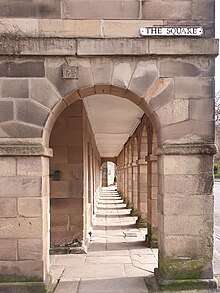The Square, Buxton
| The Square | |
|---|---|
 | |
| General information | |
| Town or city | Buxton, Derbyshire |
| Country | England |
| Coordinates | 53°15′29″N 1°55′01″W / 53.258°N 1.917°W |
| Ordnance Survey | SK0571973512 |
| Construction started | 1803 |
| Completed | 1806 |
| Client | William Cavendish, 5th Duke of Devonshire |
| Design and construction | |
| Architect(s) | John White |
| Designations | |
Listed Building – Grade II* | |
| Designated | 25 January 1951 |
| Reference no. | 1257843 |
The Square is a Grade-II*-listed building in Buxton, Derbyshire, England. It lies in the town's central Conservation Area immediately between The Crescent, the Old Hall Hotel, the Pavilion Gardens and the Buxton Opera House.

The building was designed by architect John White (who also designed St John the Baptist Church, Buxton) and constructed from 1803–1806 for William Cavendish, 5th Duke of Devonshire.[1] It was built as a series of six grand Georgian town houses from ashlar gritstone with a slate hipped roof. An arched, covered colonnade walkway at ground level features on both sides of the roadside facade.[2]
The Square is built over the River Wye (which is channelled underneath through a culvert) due to the lack of space in the narrow river valley.[3]
The renowned Buxton water physicians Sir Charles Scudamore and Dr William Henry Robertson lived and practised medicine at The Square.[1] The Victorian architect Robert Rippon Duke was also an early resident.[4]
There is a rare Grade-II-listed Victorian Penfold hexagonal post box from 1866 opposite The Square.[5]
See also
References
- ^ a b Langham, Mike (2001). Buxton: A People's History. Carnegie Publishing. pp. 10, 111. ISBN 1-85936-086-6.
- ^ Historic England. "1–6, The Square (Grade II) (1257843)". National Heritage List for England. Retrieved 21 March 2020.
- ^ Roberts, Alan (2012). Buxton Through Time. Amberley Publishing. p. 34. ISBN 978 1 4456 0817 4.
- ^ Morten, David (2018). Buxton in 50 Buildings. Amberley Publishing Limited. ISBN 9781445678948.
- ^ Historic England. "Postbox at the junction with Water Street (Grade II) (1257818)". National Heritage List for England. Retrieved 21 March 2020.

